MSI MPG Trident A 11TG
Two-minute review
Here is the MSI MPG Trident A 11TG configuration sent to TechRadar for review:
CPU: 2.5GHz Intel Core i7-11700F (octa-core, 16MB cache, up to 4.9GHz turbo)
Graphics: Nvidia GeForce RTX 3060 Ti (8GB GDDR6)
RAM: 32GB DDR4 (3200MHz)
Storage: 1x 512GB m.2 SSD, 1x 1TB SSD
Optical drive: None
Ports: 2x USB 3.2 Gen 1 Type-A, 1x USB 3.2 Gen 1 Type-C, 1x USB 3.2 Gen 2 Type-C, 5x USB 2.0 Type-A, 4x audio jacks, HDMI/DisplayPort (on-board), 1x HDMI/3x DisplayPort (on GPU)
Connectivity: 2.5 gigabit Ethernet, Bluetooth 5.2, Intel Wi-Fi 6 AX200
Weight: 12.3 pounds (5.58 kg)
Size: 5.4 x 15.6 x 16.1 inches (13.7 x 39.6 x 41 cm; W x D x H)
Divisive. That's what this is: it's something that tears our reviewing muscles in twain. Because on one hand the MSI Trident A 11TG is a perfect little gaming PC, a combination of a highly competent 11th-gen CPU, speedy graphics processing, plenty of RAM, a neat little case and (critically) everything being done for you. And on the other, the Trident A's compact design ideals means the end product is, at least in part, hamstrung. And that's a shame.
We can trace all of the niggling problems back to that case. While it cleverly compartmentalises each of the core heat-producing bits of a desktop PC, it appears to underestimate the heat demands of its processor. It comes with a crappy cooler, and thus gets hot enough to throttle with some regularity - all this despite its fans sounding so loud that you'd swear the Trident was ready for take-off at any moment.
The compact size - MSI pins it at 10 litres, and it does feel small - doesn't stop it being upgradeable, with the majority of components being completely stock. But again we're faced with a compromise. Squashing everything into such limited space means using a compact PSU, and the 450W unit installed in here (tasked with powering a power-hungry RTX 3060 Ti) has to be sitting on the very edge of its draw limit. So you can upgrade, but only once you've stumped up for another SFF power plant. Grr.
At least this can go hard in its pre-installed configuration. Our benchmark tests may have been a hair behind where they should be with this combination of kit, but a small step back is forgivable given the confines of the case. In-game it feels slick and shrugs off just about every challenge, barely wincing (okay, nosily shouting) at running titles in 1440p. It absolutely has it where it counts.
Given that it's a powerful computing solution in a time when such things are, if not hard to come by, at least hard to build yourself, there's a lot of value in the Trident A 11TG, particularly if you can find it for a non-gouged price. You can game hard on it, it's a platform to build on, and it's smaller than your average desktop PC. Get yourself a good pair of headphones and dollop of forgiveness for its poor cooked CPU, and you're in good shape.
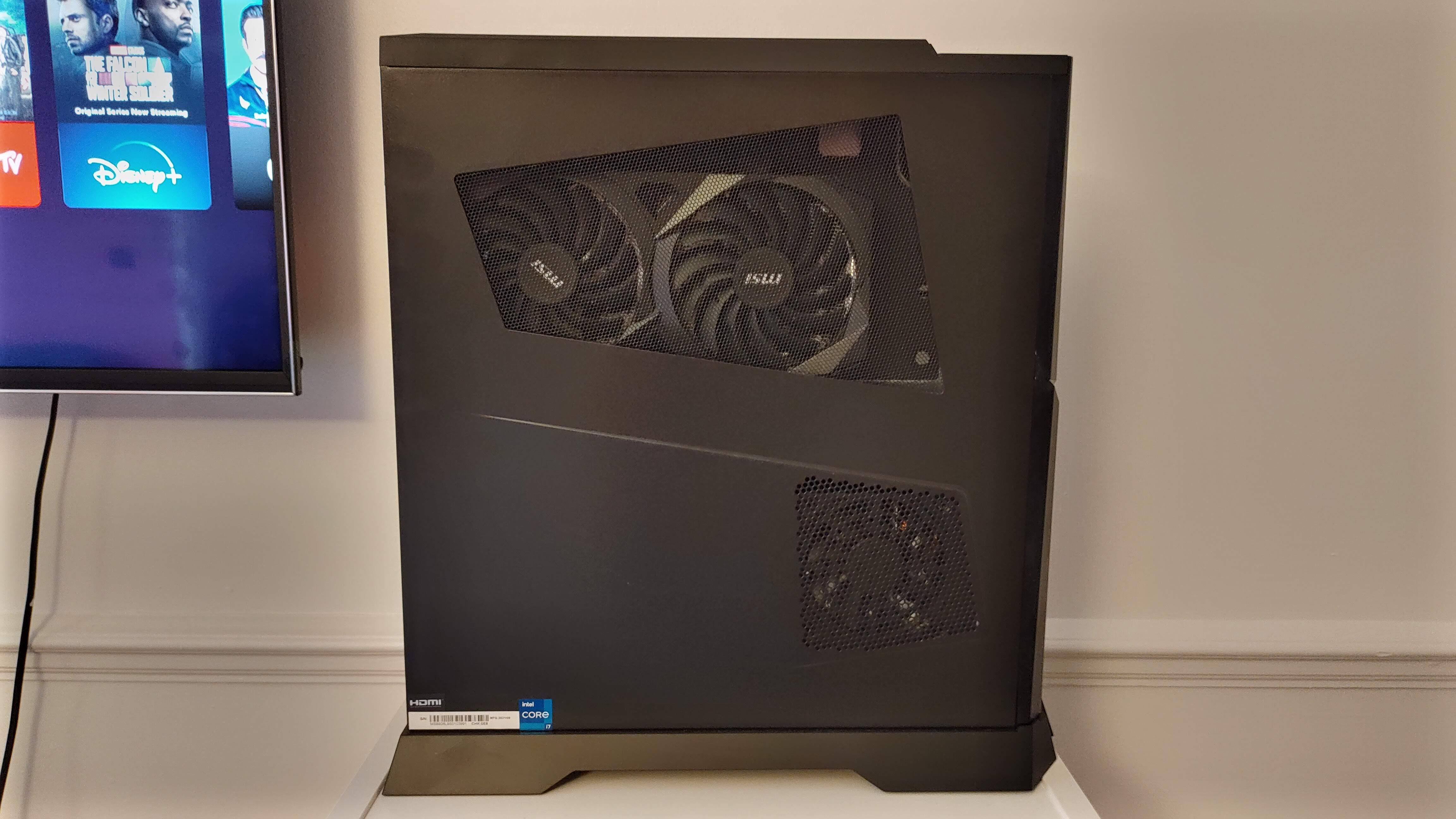
Price and availability
It's not hard to find the MSI MPG Trident A 11TG: MSI has shipped this out to a broad range of stockists, some outside of the specialist space: in the UK, for example, you can find it at the likes of AO and Box. And it's not super-expensive, at least in the context of desktop PCs with proper GPUs in 2022, retailing at £1,599.
Note, though, that the Trident A 11TG reviewed here looks to be a UK-only configuration. MSI's Trident offerings in the US and Australia are limited, at the time of writing, to the 10th-gen edition if you want this shell, which is now starting to show its age, and the Trident 3 series, which sports a different case - something which would likely vastly change our opinion of it.
Is it expensive? Eh, maybe? No? You could likely build something similar for less, if you can get hold of the parts - but in the current market that's a big 'if'. In the context of pre-built 3060 boxes, it's a decent price - and far cheaper than the likes of the Corsair One, though that does feature far higher specs.
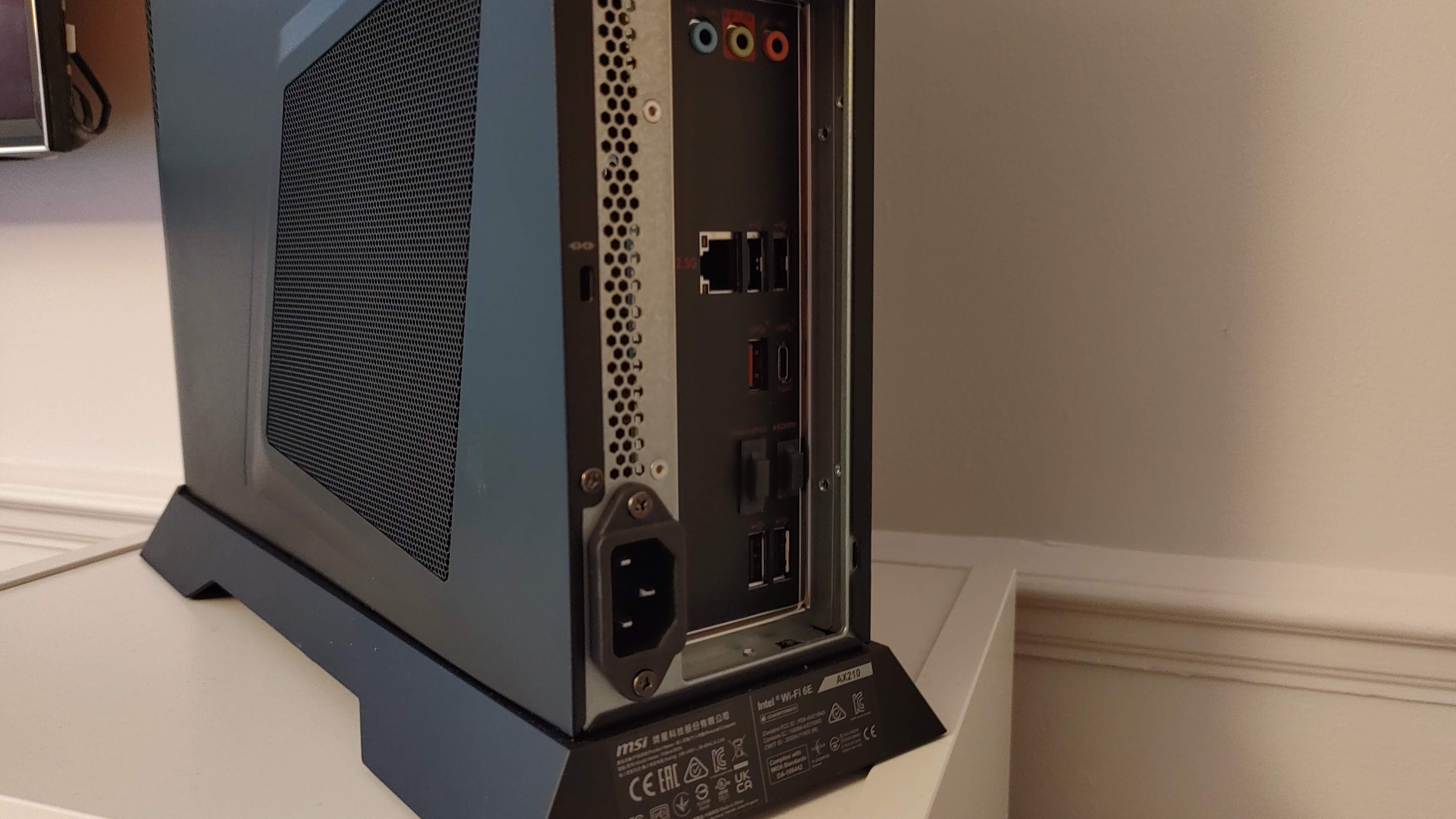
Design
Can small form factor design and high-end PC hardware really mix? Uh, yes: the Corsair One, to return to but one example, does the job magnificently, and there's a huge sector of the enthusiast market which delights in cramming as much power into as small a space as possible.
The M SI MPG Trident A 11TGdoes fit the category, trimming off a lot of size on each of its edges compared to most chunky desktop PC cases, though the overall effect is more of a thin PC rather than an overtly small one. It's not super-light, it's not /that/ small, and it's not, at least in this reviewer's opinion, particularly beautiful, sporting a bunch of needless Gamer Angles and a touch of RGB which is neither big enough to be spectacular nor small enough to be subtle. Basically, it's a PC designed to fit a very particular niche. If you desperately need to claw back a couple of inches of desk space, this is the solution.
The MSI MPG Trident A 11TG's compressed design comes with a bunch of niggling compromises, and we'll save the most glaring - the performance and cooling - for later. This is a horizontally-aligned PC forced into a vertical shell, which means all of the ports are also vertically aligned - including the front I/O. Admittedly this isn't a deal-breaker, and MSI was savvy enough to put a much appreciated Type-C port on front alongside a pair of USB Type-A ports.
The squashed nature of the case doesn't actually hurt the area available to rear I/O, with a generous selection of Five USB Type-A ports, a second Type-C, 2.5 gig ethernet, on-board HDMI and DisplayPort and three audio jacks present. The vertically-aligned RTX 3060 offers three DisplayPort sockets and a single HDMI.
A trip inside shows glimmers of genius. Each of the key components is given its own vague section in the case, for example, with the GPU (in this case an RTX 3060) in the top compartment drawing air from the right, and the PSU and motherboard in the lower half, the CPU drawing air from the left and the PSU from the right. While there's a spare slot for RAM and space for a 2.5" SSD, that's about it - and there's basically no extra room to work with.
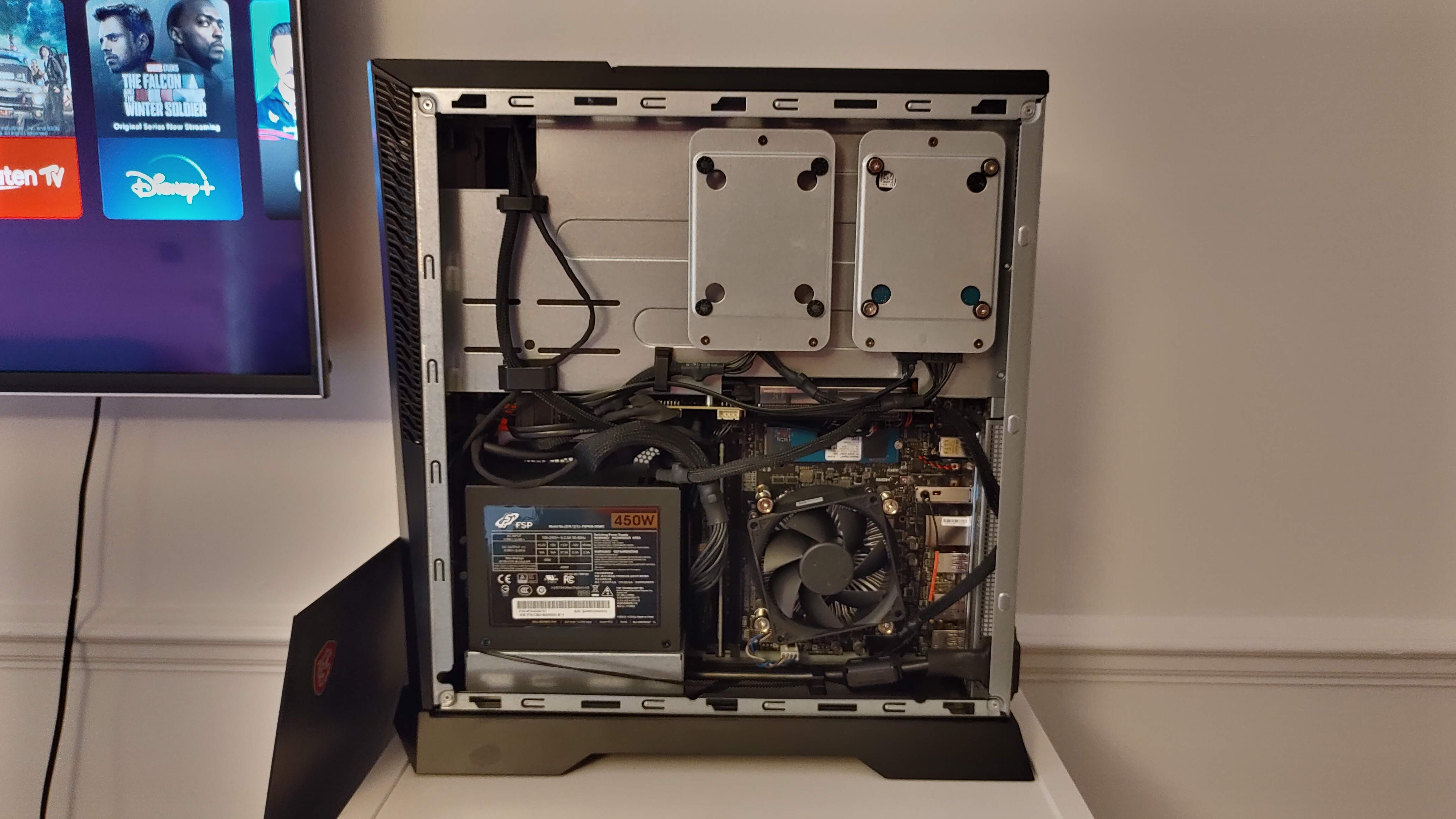
It's a positive, though, that it is technically possible to upgrade the MSI MPG Trident A 11TG, and you won't always have to scour the marketplace for special components to do so. It'll take an off-the-shelf CPU upgrade or a short-enough graphics card. Many smaller desktops are more locked down, so this gets a tick as far as longevity is concerned - though there's only 450W coming from its PSU, so you'll probably need to find a compact-enough boosted power plant before you can even consider bumping up any of the main components.
A note here on an aspect which didn't affect the Trident's score but which really does deserve a mention: out of the box, our review unit absolutely stunk. It smelled strongly of - and we'll acknowledge that this is not a particularly useful comparison - the Sticky Toffee Pudding vape juice that was banned from this reviewer's house the instant his wife got a whiff of its overpowering stench. Think burnt sugar. It may not affect every unit, and it began to dissipate quickly enough, but it's worth mentioning.
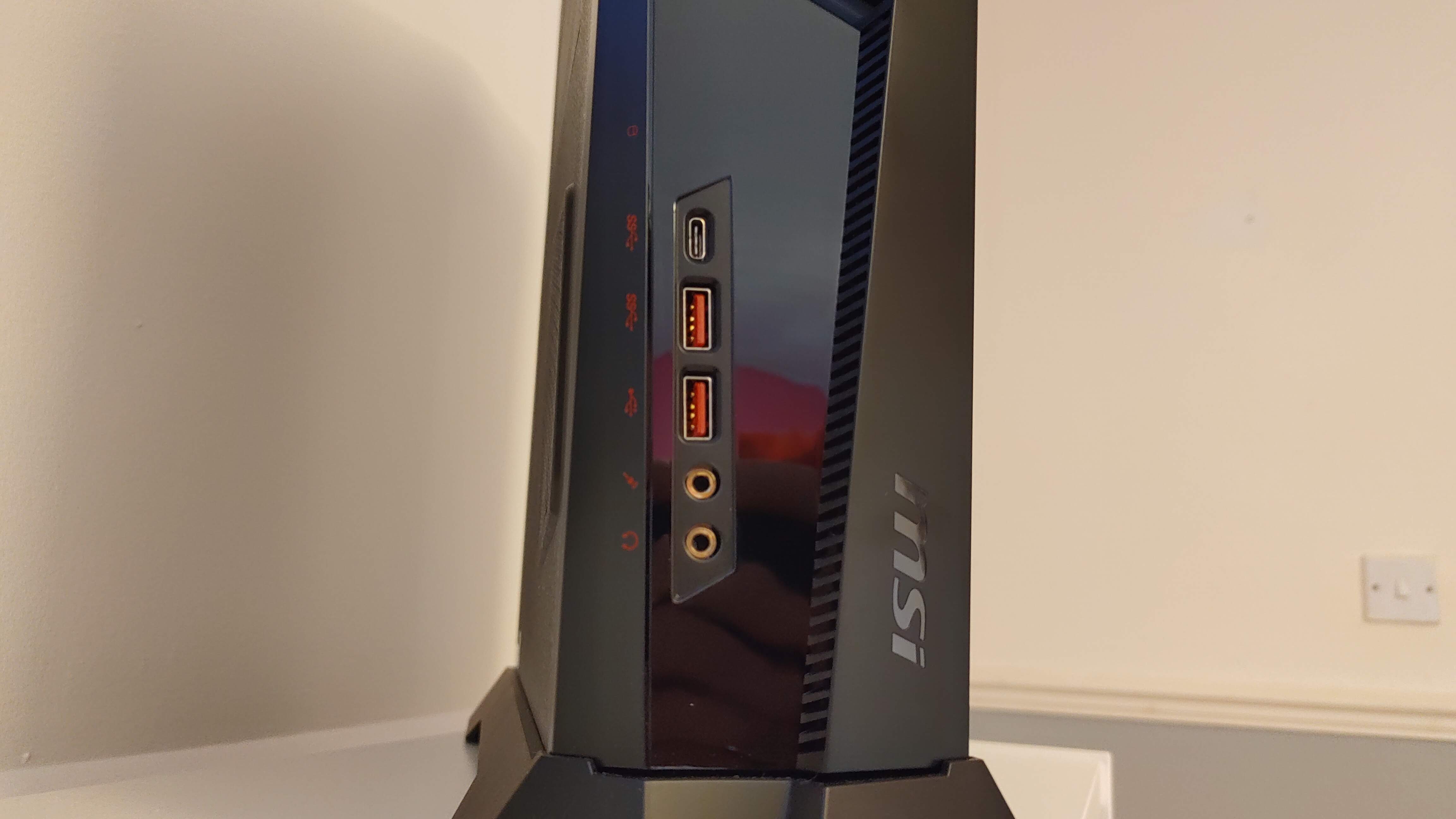
Performance
Here’s how the MSI MPG Trident A 11TG performed in our suite of benchmark tests:
3DMark: Night Raid: 49,463; Fire Strike: 20,870; Time Spy: 10,232
Cinebench R20 Multi-core: 3319 points
GeekBench 5: 1528 (single-core); 6257 (multi-core)
PCMark 10 (Home Test): 6658 points
Total War: Three Kingdoms (1080p, Ultra): 87.0 fps; (1080p, Low): 232.8 fps
Metro Exodus (1080p, Ultra): 76.09 fps; (1080p, Low): 148.26 fps
The MSI Trident A 11TG is a slick little performer. That's about all you really need to know. It's fine. The 3060 Ti wrangles graphics perfectly competently, the 11th-gen Core i7 CPU is strong enough to offer significant snap to everything that needs it, there's more than enough RAM and possibly not quite enough storage. It works well. But it's really not quiet about it.
This thing whines hard. Even sitting idle the fan noise is very apparent, presumably because of the limited potential for airflow in its compact case. When it's working hard it gets much louder; not so loud that it couldn't be a living room PC, but you'll notice it if you're listening for it. Worse still, somehow, is the middle ground, which hits some kind of harmonic resonance which makes the fans output (according to a guitar tuner app) a perfect E flat note.
The fans are a problem in couple of other ways, too: while the GPU gets a standard shroud which is more than capable of keeping it frosty, the CPU is offered only the most basic stock cooler, something which isn't quite so capable at heavy loads. In our benchmark tests it proved a definite bottleneck, hitting the thermal throttling point particularly when running tests which favour a single core, and at times idling close to 65 degrees Celsius. And then, conversely, there's the lack of fans: there's no airflow in the case beyond fans strapped directly to components, and so no real exhaust. The heat just kind of floats upwards.
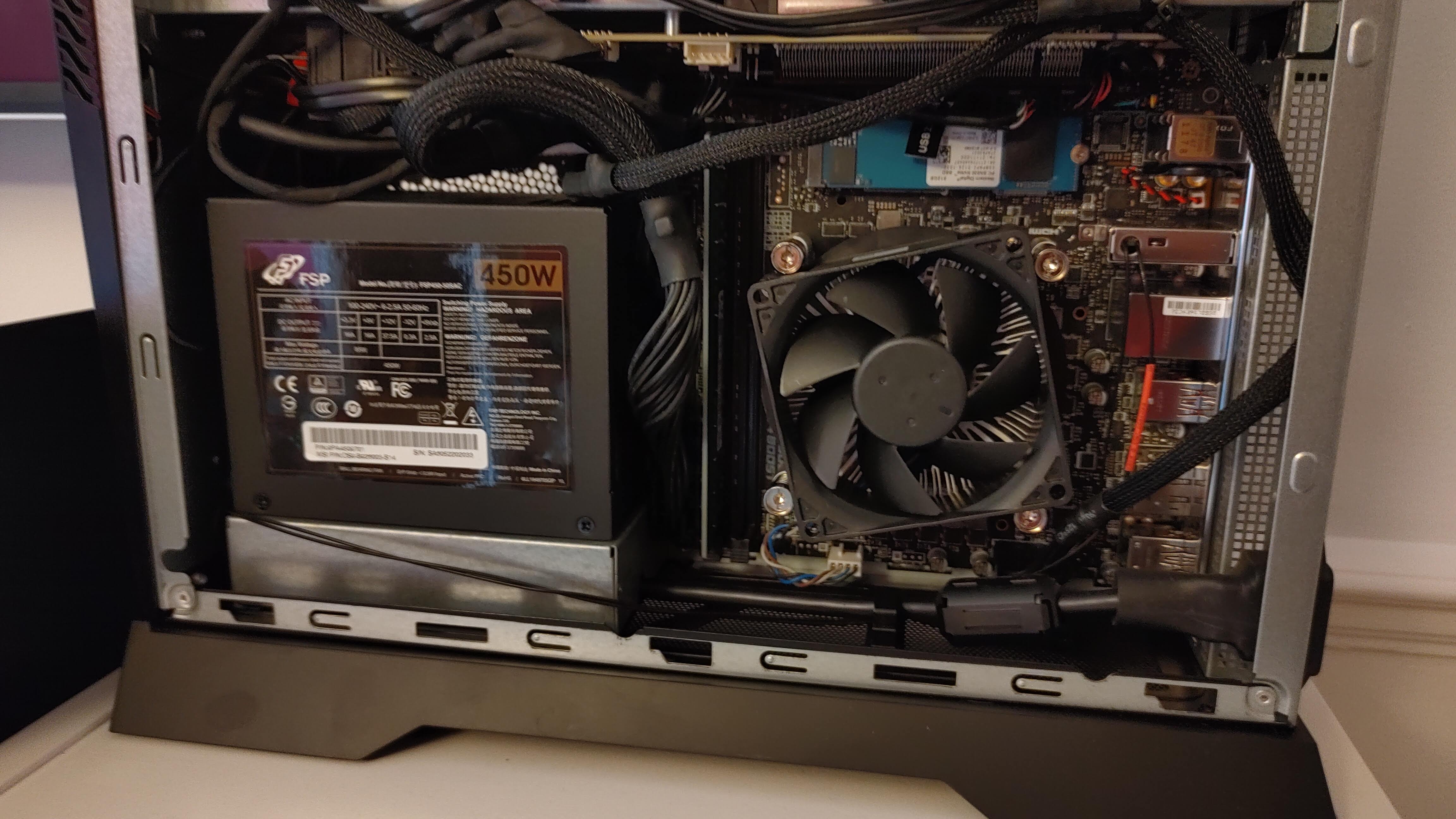
When reviewing anything it's difficult not to harp on the negatives, so let's pivot to the positive. It's not as if, for example, the MSI Trident A 11TG can't push games well. It really can: playing at 1080p was syrupy-smooth, and 1440p was entirely decent with everything we tried. It's a pleasure to use.
Its package of communications extras, from Wi-Fi 6E to 2.5 Gigabit Ethernet, is fast enough that it's not going to feel slow within this machine's lifespan unless you decide to use it as a hardcore file server, which you really shouldn't. The included storage is reasonable and speedy, with just enough present that it doesn't feel stingy; the single stick of 32GB RAM is generous and leaves a slot open for expansion, though you do miss the potential advantage of running dual-channel memory.
And hey, it's a fully-functional desktop PC at a time when building your own might not be an option, or something you actually want to do. If a little noise isn't a problem - or if you're prepared to find the right low-profile components to cool this effectively without the caterwauling - then the performance here could even be better than you might expect to prise out of the limited confines of a small form factor PC.
Buy it if...
You want (a certain level of) gaming power
The RTX 3060 Ti isn't the fastest card out there, but its burlier siblings do skew the scale somewhat. Compared to the previous generation it absolutely flies, and if you're stepping up from a machine with a 10-series card it'll be a revelation.
You're very specifically short on space
The Trident A case is small form factor - perhaps, with a big enough bag, it might be plausible to chuck it in a rucksack - but it's not super-small. If shaving off a few inches compared to a big-boy PC case is crucial, and if you're happy to stay vertical, it's great.
You're not up for building your own
Yes, this is a pre-built PC. It's obviously not for self-builders. But right now there's every reason to just plump for something like this: all the hard work is done, all the parts are sourced at once, and you're left with a powerful machine which you can upgrade later.
- These are the best gaming PCs
0 comments:
Post a Comment